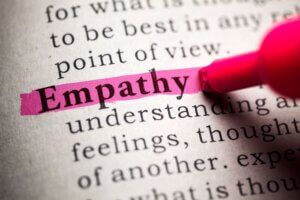Highly Sensitive Persons (HSPs) are a unique subset of the population who possess high emotional sensitivity and empathic abilities. What’s more, they experience the world around them in a more profound and intense way than others. This article explores the concept of high sensitivity and empathic ability. It also goes over the challenges and benefits of living with these traits.
Additionally, we discuss the relationship between introversion, Sensory Processing Disorder, and empathic abilities. We also discuss useful tips for HSPs to cope with their sensitivities.
What is High Sensitivity?
High Sensitivity is a personality trait with emotional sensitivity, a reaction to both external and internal stimuli, and a complex inner life. It was first identified by psychologist Elaine Aron and is also known as Sensory-Processing Sensitivity (SPS). Interestingly, HSPs comprise about 15 to 20 percent of the population, making it a relatively common trait.

Understanding High Sensitivity Person: The Connection to Empathic Abilities
Empathic ability refers to the ability to sense and feel the emotions of others. Not surprisingly, HSPs often have higher empathic abilities. With this ability, they naturally pick up on the subtle emotional cues of those around them. In turn, this leads to deep connections and a high level of understanding for the feelings of others. However, it also gets overwhelming and draining. In fact, HSPs often struggle to differentiate between their own emotions and those of others.
Living with High Sensitivity: Challenges and Benefits
a. Challenges
Highly sensitive person have their challenges. First, HSPs often struggle to adapt to new circumstances. They also demonstrate seemingly inappropriate emotional responses in social situations. Additionally, they are uncomfortable in response to light, sound, or certain physical sensations. As a result, they often experience higher levels of stress, anxiety and depression.
b. Benefits
On the other hand, living with high sensitivity also includes benefits. One advantage is that HSPs often form deep bonds with others, have exciting dreams and internal monologues. For another, they also find great enjoyment in art, music, and human connections. What’s more, they experience higher levels of creativity, deep personal relationships, and a great appreciation for beauty.
c. Introversion and High Sensitivity
While there is a strong correlation between introversion and high sensitivity, they are not the same. Approximately 70 percent of HSPs identify as introverts, according to Elaine Aron. Specifically, introversion refers to a personality trait in which someone “recharges” by being alone. However, high sensitivity encompasses emotional, physical, and sensory sensitivity.
Sensory Processing Disorder vs. High Sensitivity
Sensory Processing Disorder (SPD) is a condition in which the body and brain don’t respond well to sensory input. Moreover, it’s different from high sensitivity. That’s because while an HSP has a stronger reaction to sensory input, their brain and body still responds to the stimuli correctly. What’s more, knowing the differences between these two conditions better identifies and manages their sensitivities.

What is Empathic Ability?
An empath is someone who experiences a great deal of sensitivity to the emotions of others. Interestingly, they easily sense what others are feeling. Of course, this makes them excellent listeners and compassionate friends. However, their emotional sensitivity is often overwhelming, making self-care and boundaries highly important.
4 Common Signs of Empathic Ability
a. Great Listener
As a great listener, you are sense how others are feeling. You also know if someone is being truthful. You may also sense that something is wrong but don’t know exactly what that is.
b. Introversion
You tend towards introversion and as a result, you regularly need time alone to recharge. In fact, you often find yourself retreating from crowds and social situations.
c. Emotional Intelligence
You exhibit high emotional intelligence and intuition in dealing with others and relationships. Also, forming deep connections with others and being naturally supportive is a common occurrence with you.
d. Difference Between Feelings
Finally, struggling to know the difference between your own feelings and those of others sometimes gets the best of you.
Tests for Empathic Ability
There are books available, such as the one by Dr. Judith Orloff, author of The Empath’s Survival Guide. This book helps individuals determine if they possess empathic abilities. In fact, answering yes to more than three questions on these tests may indicate that you are process high empathic abilities.

Emotional Triggers that Cause Emotional Stress for Empaths
a. Feelings of Failure
Feeling like a failure when unable to solve others’ problems often causes you stress and even depression.
b. Hard to Say No
Struggling to say no or set boundaries keeps you out of balance mentally, spiritually, and physically.
c. High Sensitivity
Sensitivity to other people, noise, and hectic environments in a normal part of who you are.
d. Overwhelming Feelings
Experiencing overwhelming feelings from negative experiences and emotions keeps you from enjoying life.
e. Difficult Relationships
Difficulty with too much physical contact or intimacy makes relationships difficult for you.
4 Tips for People with Empathetic Ability to Cope with Sensitivities
1. Set Boundaries and Stick to Them
Learn to say no and find comfort in not solving others’ problems. To do this, try creating a schedule that allows for self-care every day.
2. Practice Mindfulness/Self-Awareness
You must separate thoughts and feelings from reality and practice “non-identification” with others. Doing so enables you to better understand your emotions as separate from others.
3. Carve Out Enough Alone Time to Recharge
Empaths need time alone to unwind and recharge. Which, of course, is ideally in a quiet, peaceful environment.
4. Practice Self-Compassion
Empaths must remember to extend the same compassion to themselves that they offer to others. This involves replacing self-critical thoughts with positive, affirming ones.
Educational HSP and Empathetic Ability Shopping Suggestions



Conclusion
In conclusion, living with high sensitivity and empathic abilities can be both challenging and rewarding. Understanding these traits and employing strategies to cope with them can help HSPs and empaths lead fulfilling lives that embrace their unique perspectives and connections.
It is our wish that you find this post enlightening and helpful. If you have any questions or suggestions, we love to hear from you in the comments below. Also, kindly accept our invitation to join our group on Facebook to surround yourself with kindred spirits and post your encouraging messages.












































